
A Living Document


A Living Document
The nine members of Board of Trustees are appointed by the County Commissioners as the governing body for CCBC. Their duty is to provide a public service aimed at continual improvement of the Community College of Beaver County.

Dr. Robert H. Postupac 2014 - 2026

Mr. Stephen W. Robinson Treasurer 2010-2022


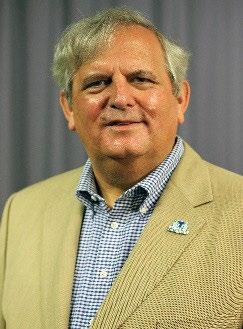

Mr. Frederick Retsch 2008-2022

Ms. Genetha M. Woods-Short Secretary 2012-2024


Dr. Roger W. Davis, College President
Dr. Shelly L. Moore, Vice President of Academic Affairs and Provost
Ms. Angela Hamilton, Vice President of Student Affairs and Enrollment
Ms. Sally A. Mercer, Vice President of Human Resources
Mr. Glenn Natali, Vice President of Finance, Operations, and Information Technology
Mr. Brenden Sutter, Director of Facilities and Grounds
Mr. Kolton Codner, Chief of Staff, Associate Vice President of Presidential Initiatives, Executive Director CCBC Foundation
Ms. Leslie Tennant, Associate Vice President of Communications
Dr. Shelly L. Moore, Vice President of Academic Affairs and Provost
Dr. Katie Thomas, Dean, School of Business, Arts, Science, and Technology
Ms. Jessica Diehl, Data Analyst, Research, and Institutional Effectiveness
Ms. Lauren Susan, Associate Dean, High School Academies and Dual Enrollment
Ms. Micki Serak, Executive Assistant to the Provost
The Academic Master Plan (AMP) is a flexible plan which supports the core development of the academic framework of the college while identifying the resources and actions necessary to push that framework forward. AMP integrates into the college’s strategic plan, supporting the overall goals, priorities, and outcomes of the college, including its Key Performance Indicators (KPIs). AMP also guides integrated planning across academic schools and informs budgetary decisions. While this plan establishes CCBC’s five-year academic framework, it is not static. Priorities, goals, and outcomes may change as the college continues to strive for academic excellence.
An Academic Master Plan (AMP) was developed and implemented in 2017 by the former Executive Vice President of Academic Affairs and Provost, and current President, Dr. Roger W. Davis. The college made clear progress on many elements of the plan such as program review, development of an honors program, faculty advising, and growth of the High School Academies.
In 2019, the Covid-19 pandemic changed the world and created enormous challenges for higher education institutions. CCBC faculty, staff, and administration recognized the need to change with the rest of the world while maintaining a goal of providing quality education. In response to the overwhelming needs of the students, the college began to implement innovative new strategies to help students navigate the pandemic and the “new normal.” In March 2019, the campus moved to completely online learning within a matter of days. All courses were assessed to ensure quality of instruction and services such as mental health counseling and academic coaching were made available to students virtually. While these changes were extremely challenging, they underscored the value of using technology to move the institution forward. For instance, the pandemic spurred the implementation of a wide variety of virtual learning experiences including science labs, clinical experiences, academic advising, and integrated teaching modalities.
By fall 2020, learning spaces in the Learning Resource Center were reconfigured to Titan Flex classrooms to support multi-modal instruction, which provided students with the opportunity to choose how they would attend: face-to-face, synchronously, asynchronously, or a hybrid combination of these options. Titan Flex classes fostered student autonomy and created opportunities for students to learn and engage at a time and place that was convenient for them. Faculty remained flexible, providing additional support, extensions on due dates, and opportunities to make up assignments missed because of illness. But, despite all efforts, some students found it impossible to deal with the complexities of obtaining a college education during a pandemic and many high school graduates chose to sit out a year before attending college, resulting in decreased enrollments and dips in retention.
As of fall 2021, the public struggles to return to normalcy as vaccines and boosters are made available and the pandemic appears to be far from over. The development of new variants reminds us that we must remain patient and diligent. Some students are returning to campus and adjusting to the “new normal.” Others have recognized the benefits of flexibility and increased use of technology. However, many challenges remain and with adversity comes opportunity. This plan will highlight opportunities for growth as we focus on strategic initiatives over the next five (5) years.
Below are the College’s vision, mission, strategic priorities, and core values:
Vision
To lead, educate, innovate, and inspire.
Mission
CCBC transforms lives through personalized education, dynamic partnerships, and high impact practices.
Areas of Focus
The College has adopted the following areas of focus:
Leadership and Service
CCBC will guide and support the transformation and vitality of our community through innovative teaching; workforce and economic development leadership; and community, regional, statewide, and national service.
Partnerships and Preparation
CCBC will be known as “the partnership college” through relationships that provide integrated programs and teamed approaches to fostering community development, expanding the economic potential of the region, and creating opportunities for lifelong learning.
Expansion and Innovation
CCBC will develop specialized training to address high-priority workforce needs, create opportunities for college credential attainment in a variety of formats and modalities, and contribute to causes and activities that serve our region and its people.
Connection and Engagement
CCBC will create places and spaces where every student, employee, and community member feel welcome and finds success in an atmosphere that inspires excellence and positions the college for growth.
CORE VALUES:
General education encompasses the knowledge, skills, and abilities essential for success in a diverse, complex world. Community College of Beaver County (CCBC) is committed to ensuring its general education offerings establish a foundation on which students can build lives and careers of leadership, civic engagement, and human consideration. The four general education outcomes and a definition of each is listed below.
Inquiry and Analysis is the central pillar of all learning, encompassing the ability to think critically and reason soundly to ensure the thoughtful evaluation of content through research and other academic activities. Inquiry and Analysis is the foundation of a strong general education, informing the curricula of all general education competencies as well as specific areas of study through its focus on logic, evaluation, reasoning, research, and problem-solving.
Diversity and Social Action prepares students to successfully engage in our diverse, global world by providing students with experiences to enhance both their personal and cultural awareness while promoting respectful communication and relationship building. The curriculum for Diversity and Social Action provides the lens for critical analysis through which students are encouraged to become agents of social action by demonstrating social responsibility, advocating for social justice, and engaging in the ethical examination of issues which are essential to the sustainability of individuals, communities, and the environment.
Technology and Information prepares students to utilize technology and language to communicate information in an effective manner. The curriculum for Technology and Information establishes the expectation that students use technological means to gather, evaluate, document, and process complex data and information to synthesize ideas and convey findings in a logical manner that contributes to personal, professional, and/or community growth.
Scientific Reasoning and Numeracy prepares students to think critically and objectively, to interpret data, and to analyze mathematical and scientific information. The curriculum for Scientific Reasoning and Numeracy develops students’ skills in drawing appropriate conclusions from scientific data, in using data presented in a variety of mediums to formulate hypotheses, in applying appropriate methods to solve problems, and in estimating and evaluating the validity and reasonableness of results.
Currently, Beaver County’s population estimate as of July 1, 2019, according to the U.S. Census, stands at 163,929, down from 170,539 in 2010. 93.1% of the residents are High School graduates, and 24.7% have a bachelor’s degree or higher. Two metrics that have tremendous impact on the College are that sadly 11.7% of our residents live under the poverty level and 22% of Beaver County residents are 65 years or older. Approximately, 90.5% are white, 6.5% Black or African American, and 2.2% reported a mixed race. Hispanics account for less than 2% of the population.
Below are unique facts about the schools, locations, finances, and other data that reflect our current situation. On a positive note, the college has maintained accreditations in all areas and our list of accomplishments continues to grow each year. We are among the highest of the Pennsylvania Community Colleges when it comes to retention. At the same time, we must acknowledge that human and financial capital are limited, and enrollments continue to decrease. All these things must be considered as we plan.
• CCBC Main Campus
1 Campus Drive, Monaca, PA 15061
• CCBC Aviation Sciences Center
125 Cessna Drive, Beaver Falls, PA 15010
• CCBC @ Parkway West Career and Technology Center
7101 Steubenville Pike, Oakdale, PA 15071
• CCBC @ Washington Area Career and Technology Center
688 Western Avenue, Canonsburg, PA 15317
Table 1 and Figure 1 highlight the appropriations the college receives and the revenue and budget figures. Unfortunately, overall appropriations have not kept up with inflation and expenditures, resulting in a modest increase in tuition over the last several years.
Table 1: Finances

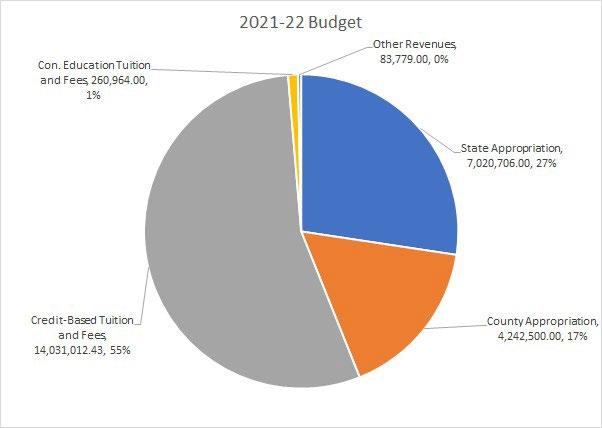
In addition to national accreditation from Middle States Commission on Higher Education, several programs at CCBC are accredited or undergo review by outside agencies. These include:
• Middle States Commission on Higher Education (Next visit Spring 2023)
• Disciplinary:
Nursing, ADN-Accreditation Commission for Education in Nursing (ACEN; received reaffirmation for 8 years in 2019)
Phlebotomy-National Accrediting Agency for Clinical Laboratory Sciences (NAACLS; reaffirmed every 5 years; next reaffirmation 2024)
Process Technology- North American Process Technology Alliance (NAPTA) associated school (2016; reviewed and renewed as requested)
The College has four schools and eight academic pathways:
• School of Business, Arts, Sciences, & Technologies (BAST)
Business and Communication
Criminal Justice and Social Service
Education
Liberal Studies
Science and Math
• School of Health Sciences (SOHS)
Health Sciences
• James M. Johnson School of Aviation Sciences (SAS)
Aviation Sciences
• School of Industrial Technology and Continuing Education
Engineering, Manufacturing, and Construction
The following table (Table 2) depicts the race/ethnicity and gender of students at CCBC:
Table 2: Demographics
1- Under-Represented in Population (UP) includes individuals reporting race/ethnicity as Asian or Pacific Islander, American Indian or Alaskan Native, Hawaiian/Pacific Islander, or Non-Resident Alien
2- Unknown includes individuals for whom no race/ethnicity information is available
The following figures show the average GPA for students, as well as retention and completion rates.
• GPA (Fall 2021-22 AY)
o
• Retention (Fall to Spring 2017) Main 2-year Cohort
o Retention Rate (Fall-to-Spring)
• Completion (Fall 2013 Entering Students)
o
CCBC ACADEMIC POINTS OF PRIDE
We are proud of our accomplishments at CCBC. We are small but mighty! The following list provides a brief overview including accomplishments associated with each School.
• Serves 3,500 credit and more than 2,500 non-credit students
• Accredited by the Middle States Commission on Higher Education
• Named Best College/University in Beaver Valley
• Achieving the Dream Leader College
• Named a Military Friendly School by G.I. Jobs magazine
• First non-profit higher-education institution in PA to provide textbooks online for one low fee
• 1 out of 25 jobs in Beaver County is supported by the College and its graduates
• Ranked #5 best community college in Pennsylvania (2020)
Johnson School of Aviation Sciences
• Placed an air traffic controller in every tower in the country
• Placed a professional pilot in the cockpit of every major airline
• The only school in the world where a student can earn a Control Tower Operator certificate
• 200 Professional Pilot students
• 60 Air Traffic Control students
School of Industrial Technology and Continuing Education
• Offers the only NAPTA-associated Process Technology program within 300 miles of Pittsburgh
• Flexible-entry, Flexible exit Model
• Home of the Mascaro Construction Management program/Mascaro Institute
• EMT program earned national accreditation from EMS West
• A WednetPA partner and provides customized training solutions for businesses and corporate partners Like Shell, 3M, and Ardex
• Opened the Shell Center for Process Technology in 2020, a state-of-the-art training and educational facility
• Practical Nursing program has consistently high NCLEX pass rates, with most years at 100%
• #2 Practical Nursing program in Pennsylvania according to practicalnursing.org and topnursing.org (2021)
• #11 ADN and #2 LPN program in PA (Nursing Schools Almanac)
• ADN program graduates achieve a high level of success on NCLEX exams with first-time pass rates remaining at or above the national average
• Employment rates for recent graduates near 100%
• 100% pass rates on Phlebotomy Certification Exam for over 20 years
• Offers a PN to RN program in Washington County
• New Programs in 2022: Medical Assistant Certification and A.S. in Medical Office Management
• Largest academic school offering over 40 programs
• Academic core courses help support the more than 600 program-to-program articulation agreements established with four-year institutions locally and nationally
• Police Academy is offered in partnership with the Municipal Police Officers Education & Training Commission and provides Act 120 certification for new PA officers and Act 180 training for current officers
• Offers Preschool or Infant Toddler Child Development Associate (CDA) credentials onsite or online for early childhood educators in Beaver and Lawrence Counties
• Criminal justice, cybersecurity, liberal studies, and education programs and most general education courses available fully online
• 90% of all general education classes use Cengage textbook solutions, providing students with the opportunity to purchase texts for an annual subscription fee of only $180
• Numerous micro credentials in the areas of criminal justice, education, communication, social work, and technology are available to encourage reskilling and educational opportunities for non-traditional students
• 2021-2022 Cyber Security receives NCYTE recognition
• Development of a Center for Public Safety that will serve as a resource for Criminal Justice and Police Academy students, as well as public safety officers across the region
• Enables students to graduate high school with up to 28 credits of their associate degree completed
• Supports more than 150 high school students across more than 57 school districts in the region
• One of 43 institutions nationwide and the only college in Pennsylvania able to offer high school students access to Pell Grant funding
• Offers career pathways in Aviation, Health, Criminal Justice, STEM, Mascaro Construction
• New Education Academy in fall 2022
• Offers the Aviation Academy in Allegheny and Butler Counties
• Recipient of the Carnegie Science Award for Leadership in STEM Education
As an Achieving the Dream Leader College, data is paramount to moving initiatives and studentsuccess forward. Grounding financial requests, policy, and procedural changes in data is expected to provide clear and convincing evidence for these requests. It has been the College’s expectation that administration, staff, and faculty demonstrate and use our IR department and sufficient data tomove the College forward. The
Office of Planning, Assessment, and Improvement (OPAI) was established in 2017. The efforts of the Executive Director of OPAI and the Institutional Research and Data Analyst have resulted in increased confidence in the results of the data, a noted surge in data requests by as much as 60%, and enhanced use of data to make decisions across the College.
The college measures its performance on 5 key performance indicators annually: Enrollment, Retention, Completion, Satisfaction, and Fiscal Strength.
Enrollment rates (Figures 3 and 4) at CCBC have declined over the past decade. This can be attributed to several issues including fewer students graduating from Beaver County high schools (Figure 2), an aging and shrinking population, and most recently the COVID-19 pandemic.
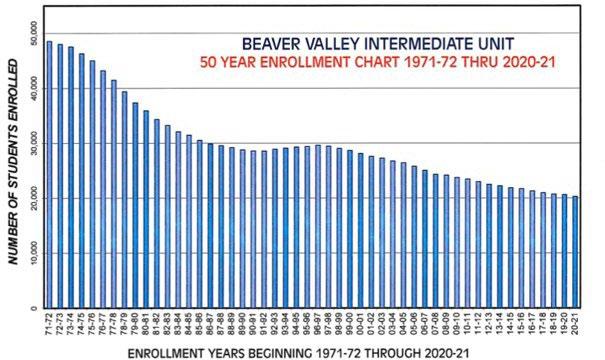
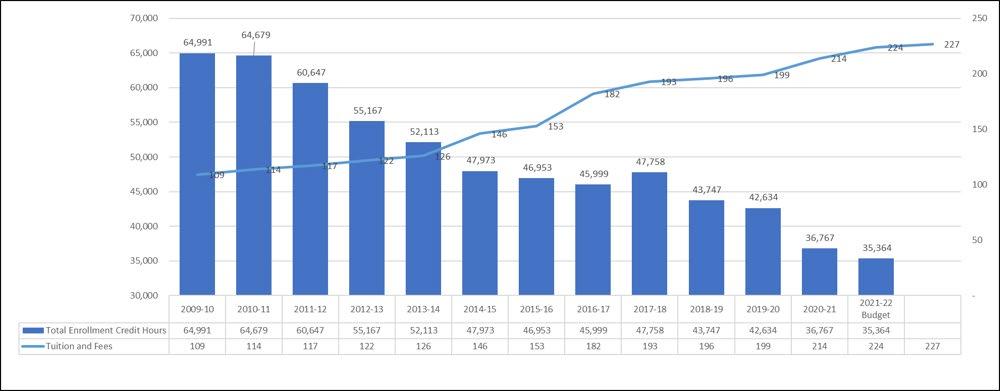
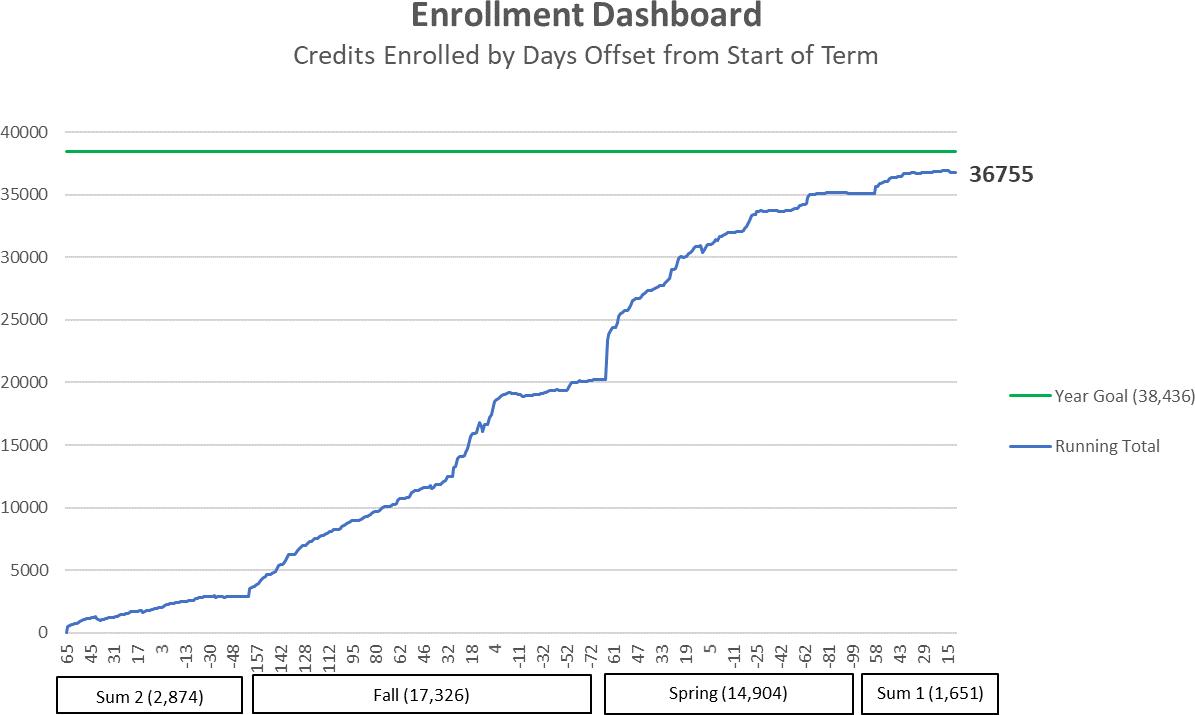
Retention rates (Figure 5) are within an acceptable range and are among the highest for community colleges across the Commonwealth.
5: Fall-to-Fall Retention Rates

In AY 21-22, the Office of Academic Affairs reviewed the strengths, weaknesses, opportunities, and threats to our academic programs. The findings are listed below.
Strengths
• Value, Affordability, Size, Location, Accredited
• Unique Programs, Career Pathways, Transferability and Articulations
• Small and Caring Staff/Faculty
• Retention
• Cengage Textbooks
• Library
• Flexible Course Modalities
• Able to make curriculum changes quickly
• Flexibility during the pandemic
• Many student success strategies in place
• High School Academies
• Faculty Advising
Weaknesses
• Internal processes that slow progress
• Small Staff
• Website contains out of date information
• Online Course Consistency
• Enrollment rates continue to fall
Opportunities
• Continued recovery efforts post-pandemic
• New Programs/online program offerings/micro-credentials/Minors
• Improved recruitment strategies
• Marketing and Recruitment (focus on Non-traditional/Adult Population)
• Strengthening Co-Curricular activities post pandemic
• Strengthening processes to improve the speed in which progress can be made
• First Year Experience
• Enhance online programming
• Enhance Titan Flex Modalities
• Professional Development (online pedagogy and student engagement; transfer processes)
• Guided Pathways
• Diversity, Equity, and Inclusion
• First Year Experience
• Developmental Program Improvements
• Titan Pathways to Success (Guided Pathways)
• Broaden Connection between Student Athletes and Academics
Threats
• COVID-19 Pandemic and additional variants
• Flight School Capacity
• Low Enrollment Programs
• Economy and Aging Population
• Decreasing High School Population
Several themes were identified through the SWOT analysis and listening tour before the implementation of the previous AMP. It was noted that the energy, enthusiasm, and excitement employees had shown highlighted an institution that was ready to seize opportunities. The seven emerging themes were: Marketing Efforts; Staff/Faculty Workloads; Innovation across academics, technology, outreach; High School Academies; Curricular Shifts; Competition; and Breaking the Steel Mill Culture.
The new executive leadership, faculty, and staff went to work to address the themes, resulting in fresh marketing efforts, new community partnerships (i.e., the Shell Cracker plant, community libraries, Bridges and Pathways educational partners), curricular changes (new programs, sunsetting of some programs, the Flexible Entry Flexible Exit Model), and new core values resulting in a change in culture and renewed energy.
A renewed focus on enrollment and retention efforts led to many new initiatives including a restructuring in Enrollment Services and the Student Success Center and other services, revitalization of Student Life, development of a food pantry, adoption of Cengage Textbooks and course materials, and many others. As a result of these many initiatives scattered across the College, and a determination to incorporate a Guided Pathways Model (Titans Pathways to Success), a new team was created: Student Titans Achieving Real Success (STARS). STARS provides an opportunity for constituents across the college to share ideas, provide updates, and focus on student success and retention efforts.
The vision for CCBC’s 2016-2021 academic plan was captured by the Academic Reach Model, which emphasized three phases of progressive academic development: fundamental, developmental, and exceptional. Building from the important work established and moved forward by the Academic Reach Model, the vision for CCBC’s 2022-2027 academic plan is represented by the Reach for the STARS Model.
The Reach for the STARS Model emphasizes six primary goal areas, which visually form the pinnacles and center of a five-pointed star. These areas are 1) Titan Connections, 2) Titan Force, 3) Titan Programs and Services, 4) Titan Diversity, and 5) Titan Community. Students assume the central position of the model. While each of these points represent distinct priorities and priority groups important to the overall academic plan, the Reach for the STARS Model emphasizes the synergy necessary between these points to enable CCBC to shine. Table 1 establishes the priorities associated with each point of the STAR model and maps these points to other institutional priorities.
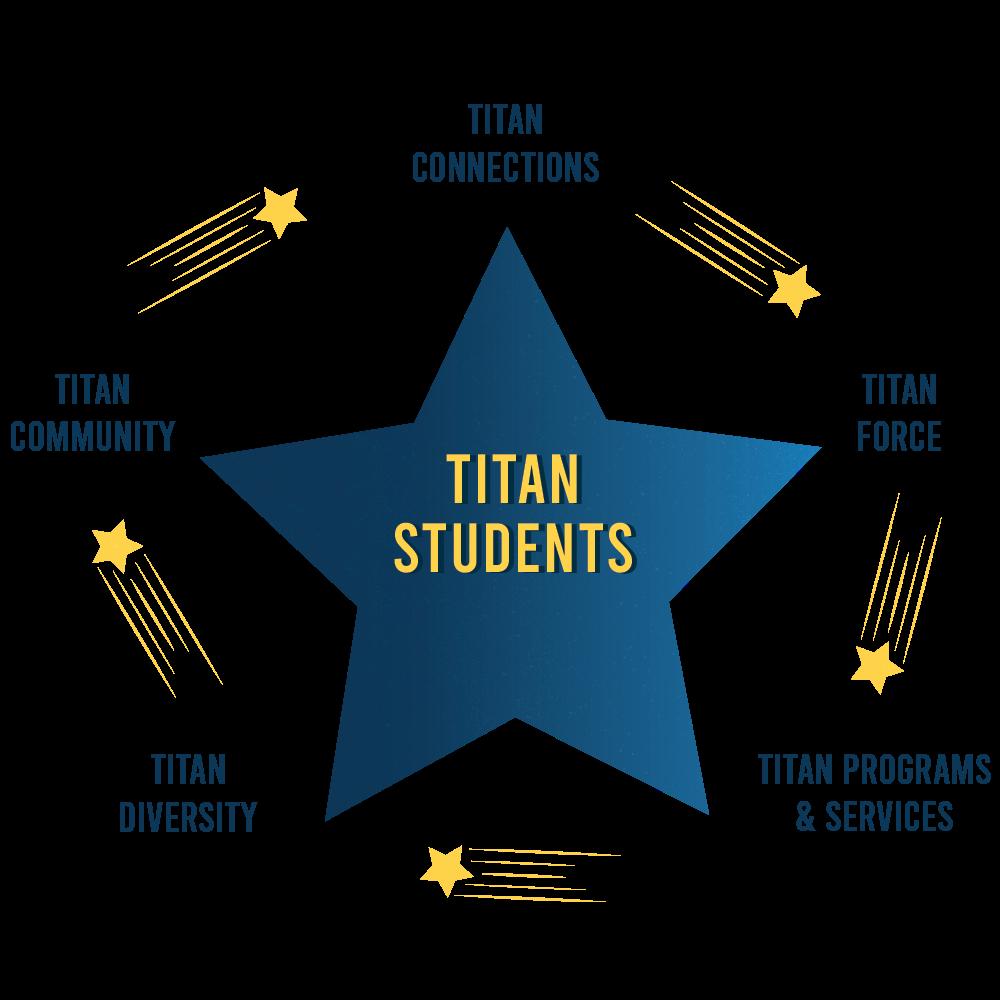
Table 3: Reach for the STARS Model and Spring 2022 through Spring 2023 Goals
STUDENT TITANS: CCBC’s core values, as represented by the acronym RAISE, put students first. The primary vision of the academic plan is to create, secure, and mobilize a culture of student success and engagement. To realize this vision, CCBC will
• Ensure students’ academic success by eliminating barriers and emphasizing equity,
• Support the student experience inside and outside of the classroom,
• Identify opportunities to engage and respond to student voices, and
• Work with Student Life and Instructional Designer to develop and provide technology training sessions for new students
Annual Goals: Spring 2022 through Spring 23
Improve student access to Blackboard via implementation of Blackboard Ultra
• Provide a smooth transition for students
• Continue Advising Day/Week events
• Continue efforts to break down barriers and increase enrollment and retention:
• Offer courses in a variety of modalities to meet student needs (Continuing COVID recovery efforts)
• Work with Student Life and others to develop technology training for new students
• Maintain or improve retention rates
• Institute new developmental model
Goal Alignment: Spring 2022 through Spring 23
• Strategic Plan Areas of Focus-AOF #1, #2, #3, #4, #6
• Key Performance Indicators-Enrollment, Retention, Completion, Satisfaction
• Achieving the Dream Priorities- Data & Technology, Engagement & Communication, Equity, Leadership & Vision, Policies & Practices, Strategy & Planning, Teaching & Learning
• Middle States Self-Study Priorities-Maximize Connections, Maximize Enrollments
TITAN CONNECTIONS: Maximizing resources and connections while improving business processes is a key priority at CCBC. Streamlining and improving processes will ensure CCBC works efficiently to effectively serve its community. To realize this vision, CCBC will
• Establish, share, and discuss essential information such as plans, goals, calendars, schedules and other key documents and opportunities, often and early,
• Identify opportunities to connect and/or map student and academic services across the college to avoid duplication and gaps, and
• Improve communication between key academic stakeholders.
Annual Goals: 2022-23
• Develop a schedule of educational program opportunities (credit and non-credit) for Community Classrooms and implement as able
• Plan to provide educational programming in Lawrence County starting fall 2022 upon approval
• Collaborate with deans, faculty, and enrollment services to increase recruitment including participation by faculty and deans, as needed at AIM for the Future Fridays for 12th graders. Increase faculty participation in other recruitment events.
• Improve processes
• Maintain MSCHE Accreditation and prepare for visit
• Maintain other accreditations (i.e., EMT, nursing, phlebotomy)
• Prepare for State Board of Nursing visit in fall 2023 to ensure a successful response
• Review and update policies, charters, and by-laws as needed
• Continue to update program assessments and measure outcomes yearly
• Complete 5-year review of Biological/Environmental Sciences, CIS/Telecommunications: Networking English, MSHT, LPN, Psychology, and Cyber Security programs starting spring 2023 (report to ASEC spring 2024)
• Complete general education assessments annually
• Maintain a 5-year calendar
• Improve room scheduling through use of new technology when available
• Continue to ‘right-size’ program offerings and course enrollments
• Collaborate with other department leaders to improve processes and timeliness of hiring, marketing, technology implementation, and development of contracts
Goal Alignment:
• Strategic Plan Areas of Focus-AOF #1, #2, #3, #4, #6
• Key Performance Indicators-Enrollment, Retention, Completion, Satisfaction
• Achieving the Dream Priorities- Data & Technology, Engagement & Communication, Equity, Leadership & Vision, Policies & Practices, Strategy & Planning, Teaching & Learning
• Middle States Self-Study Priorities- Maximize Connections, Maximize Resources, Maximize Enrollments
TITAN FORCE: The CCBC workforce is essential to supporting teaching and learning at CCBC. Members of the Titan Force act as champions and advocates, positively influencing students. The academic plan envisions a robust workforce energized and informed by diverse voices, shared planning, impactful teaching practices, and continuous improvement. To realize this vision, CCBC will
• Recruit diverse and highly qualified faculty, staff, and administrators committed to holistic student success,
• Support and provide opportunities for faculty, staff, and administrator development, and
• Encourage faculty, staff, and administrators to pursue innovation.
Annual Goals: Spring 2022 through Spring 23
• Communicate clearly, effectively, and regularly with faculty regarding current events that impact our collective work (i.e., COVID, process changes, new resources; opportunities to grow programs)
• Promote educational practices that are innovative and inclusive by providing professional development that encourages vibrant and interactive classroom activities; Aim for Excellence by continuing Master Teachers series, Professional Development Day
and CLEI activities with an eye toward equity in the classroom, quality improvement, and engagement in online learning (various modalities).
• Collaborate with IT and the Instructional Technologist to implement Blackboard Ultra and provide a smooth transition for students and faculty
• Continue to implement strategies to support newly hired faculty (new faculty mentor check lists, new faculty orientation and technology trainings, update new faculty guide annually)
Goal Alignment: Spring 2022 through Spring 23
• Strategic Plan Areas of Focus-AOF #1, #2, #3, #4, #5, #6, #7
• Key Performance Indicators-Enrollment, Retention, Completion, Fiscal Strength, Satisfaction
• Achieving the Dream Priorities- Data & Technology, Engagement & Communication, Equity, Leadership & Vision, Policies & Practices, Strategy & Planning, Teaching & Learning
• Middle States Self-Study Priorities- Maximize Connections, Maximize Resources, Maximize Enrollments
TITAN PROGRAMS AND SERVICES: CCBC’s strategic vision is to lead, educate, innovate, and inspire. The academic vision aims to provide programs and services that encourage student, faculty, and community leadership and innovation through inspiring educational opportunities that meet the needs of diverse audiences. To realize this vision, CCBC will
• Identify and implement high-demand degree and non-degree programs,
• Create pathways that clearly define students’ journey at CCBC and beyond,
• Implement programs and services that support the student experience, and
• Maximize opportunities to develop existing programs and services.
Annual Goals: Spring 2022 through Spring 2023
• Lead efforts to continue the build-out of Titan Pathways to Success Model (identify pathways; prepare maps; include transfer school info; student focus group)
• Develop Faculty Task Force to identify best practices for Titan Flex and Online Live courses
• Involve faculty and staff to drive and support Titan Pathways to Success Model
• Build out Premier Partners list for all programs as part of Titan Pathways to Success Model
• Develop Build Your Own Pathway Marketing Materials for each program (Titan Pathways to Success Model) and launch guided pathways in fall 2022 (soft launch)
• Collaborate with the VP of Student Services to develop a map of services to use with the Guided Pathways Model
• Continue to update program curriculum to meet current professional (employment) standards
• Implement new programs (MA certificate and Medical Office Management A.A.S.)
• Develop new micro-credentials based on employer identified needs and award badges for current micro-credentials
• Develop a Center for Public Safety that includes opportunities for community engagement
• Begin work on a Center for Excellence in Cybersecurity distinction
• Consider the feasibility of establishing a Titan Technical Institute (TTI) and look for funding resources to update technology and programming to meet current and future needs
• Collaborate with marketing to update program webpages
Goal Alignment:
• Strategic Plan Areas of Focus-AOF #1, #2, #3, #4, #6, #7
• Key Performance Indicators-Enrollment, Retention, Completion, Fiscal Strength, Satisfaction
• Achieving the Dream Priorities-Data & Technology, Engagement & Communication, Equity, Leadership & Vision, Policies & Practices, Strategy & Planning, Teaching & Learning
• Middle States Self-Study Priorities- Maximize Connections, Maximize Resources, Maximize Enrollments
TITAN DIVERSITY: CCBC pursues a progressive agenda and supports efforts to increase diversity, equity, and inclusion across all levels of the organization. To realize this vision, CCBC will
• Create opportunities for students and employees to engage in diversity training and education,
• Implement clubs and other extra-curricular activities that create diverse communities and opportunities across campus, and
• Identify opportunities to embed ideas of diversity, equity, and inclusion within its programs and services.
Annual Goals: Spring 2022 through Spring 23
• Continue to refine faculty search processes with an eye toward diversity, equity, inclusion
• Support the DEI team to provide diverse educational opportunities for employees and students
• Implement new general education standards which include education surrounding diversity
Goal Alignment:
• Strategic Plan Areas of Focus-AOF #1, #2, #3, #4, #5, #6, #7
• Key Performance Indicators-Enrollment, Retention, Completion, Fiscal Strength, Satisfaction
• Achieving the Dream Priorities- Engagement & Communication, Equity, Leadership & Vision, Policies & Practices, Strategy & Planning, Teaching & Learning
• Middle States Self-Study Priorities- Maximize Connections, Maximize Resources, Maximize Enrollments
TITAN COMMUNITY: CCBC’s mission is to transform lives through personalized education, dynamic partnerships, and high-impact practices. Community is a central point of the CCBC academic vision as the college aims to support its mission by exacting impactful, positive change within and around Beaver County. To realize this vision, CCBC will
• Identify opportunities to reach out into the community,
• Support and engage community organizations, groups, and individuals, and
• Respond to community needs.
Annual Goals: Spring 2022 through Spring 23
• Plan to offer programming in Lawrence County in fall 2022 if approved
• Provide opportunities for students to attend credit and non-credit classes in the communities we serve
• Develop or update advisory groups, as needed, and hold advisory meetings for all credit programs
• Partner with community agencies to develop additional internship opportunities for students
• Continue to look for innovative ways to grow the High School Academies
• Develop the Center for Public Safety and introduce it to the community Goal Alignment:
• Strategic Plan Areas of Focus-AOF #1, #2, #3, #4, #5, #7
• Key Performance Indicators-Enrollment, Fiscal Strength, Satisfaction
• Achieving the Dream Priorities-Engagement & Communication, Equity, Leadership & Vision, Policies & Practices, Strategy & Planning, Teaching & Learning
• Middle States Self-Study Priorities- Maximize Connections, Maximize Resources, Maximize Enrollments
The following Table is meant to depict the goals for the rest of the 5-year plan. It is important to note that this is a living document and changes in our environment, our community, our student needs, technology, and other resources, and as a result of the pandemic and other unforeseen challenges, can and will occur that will cause us to re-think our goals, re-strategize, pivot, and move forward to achieve success.
2023-2024 Academic Year
Continue program review cycle to ensure all programs are assessed every 5 years. Programs to review this year beginning spring 2024 (report to ASEC spring 2025):
• Education
• ADN
• General Education
• Liberal Arts: Liberal Studies
• Meteorology
• Computer Science
Continue annual assessments for each program utilizing Improve
• What updates are needed?
Updates/Date Completed
Education
ADN
General Education
Liberal Arts: Liberal Studies
Meteorology
Computer Science
3/23 Director analyzing what we have and what we need to update.
• Add Medical Assistant and Medical Office Management
Identify programmatic offerings that will yield new markets
Begin utilizing new program checklist (job outlook, financial feasibility, and more)
Continue work to implement Guided Pathways and make changes, as necessary.
3/23 Added to list of 5 year reviews
6/22: MLT
10/22 Mechatronics
02/23 Vet Tech
1/21: MA/MOM complete
12/22: Advanced Piloting
1/23 MLT in process
3/23: Mechatronics in process
3/23 to begin Vet Tech
10/22: STARS Team involved Fall/Sp 22/23: Work with Dr. Jacque Taylor from ATD to finish preparation, with a focus on campus awareness and website.
05/2023: Plan to focus on Guided Pathways at Summer Summit
Continue to grow High School Academies through unique partnerships and additional academies
Begin the education academy
Review CIHS processes and develop a new model, as appropriate
Develop and obtain approval for new business program curriculum
Involve faculty in recruitment initiatives such as AIM for the Future recruitment events for academies and senior high school students to matriculate to CCBC
Gain Middle States reaffirmation
Provide professional development that encourages vibrant and interactive classroom activities; continue Master Teachers series, Professional Development Day and CLEI activities with an eye toward equity in the classroom, quality improvement and engagement in online learning (various modalities)
Continue to collaborate with CTCs, charter, and cyber schools to develop new pathways to CCBC (students visits to campus)
09/22: Implemented modified CTC Model at BCCTC and Parkway West
08/22: Began education academy
03/15/23: Open House in Washington County for HSA
03/20/23: Dual Enrollment Specialist met with Washington, Greene, and Fayette counselors to provide information about Academies & Dual Enrollment
08/22: Initiated Education Academy with 7 students
Sp24: Adopted new guidelines for CIHS faculty to meet the needs of the changing landscape in K12.
23-24: Faculty from across the college have assisted at AIM and several
3/23: MSCHE visit successful; received affirmation with report due in Sept 2024 (submitted)
Faculty attended ACUE in spring and summer 2022online teaching and equity Faculty presented during a Master Teachers Series in 2022-2023.
09/23: BCCTC and Parkway West – now offering construction academy courses
Facilitate the enhancement of existing programs and curriculum with a specific emphasis on the following programs (develop and obtain approval for new curriculum, where appropriate; continue to build out advisory groups):
• Business
• ADN
• Criminal Justice – Sim lab and crime scene
• Technology Program updates
• IT course with e-sports
• Aviation
Evaluate the success of the FEFE Model and determine next steps, if needed
Notify ACEN and SBON related to curriculum changes to be implemented no later than fall 2023
Evaluate the success of the PT PN program and determine next steps, if needed (plan to integrate into ADN or close program)
Continue efforts to “right-size” the course schedule and maximize seat usage without effecting quality of programming
Initiate CCBC in Lawrence County (or other communities) programming if funding and approval received
Create new industrial training programs both credit and noncredit (i.e., Instrumentation, Industrial Maintenance/ Mechatronics, and Welding)
Investigate opportunities to provide Titan Transition course in High Schools or other initiatives to increase college readiness
Assess and update CIHS Model
Stabilize ATC program and develop further understanding of CCBC responsibilities surrounding Tower Operations.
Fall 2022: Business program updated and some programs sunsetted.
ADN: New curriculum approved 3/28 to be implemented fall 2023
Aviation Online program approved February 2023.
Crime Scene and Sim Lab – open house July 2022. Open to students F23.
23-24 IT courses with e-sports Esports created as a standalone class required in Computer Science; embedded aspects of gaming into CIST 100.
Summer 2024 – PTEC on hold
F23: Notification sent
Enrollments remained low despite attempt to move to PT format. Program discontinued effective fall 2023.
Numerous sections removed and numbers up in remaining sections. Will continue to monitor.
Discontinue fall 23: County has not moved forward.
F 23: Mechatronics program implemented with 12 enrollments.
F 24: Enrollment 23.
2022: Attempted to do this with Aliquippa HS but students did not register. Discontinue for now.
Completed __________________
Tower discussions involving Trustees, BVI, and others have continued for several years. 2024: Agreement signed.
Begin to market Professional Pilot program outside of the county 2023-24: Marketing across PA 2024: Following SARA/SAN requirements to operate in GA, NC, SC, and Florida.
Provide a space for faculty to record lectures
2023: Space provided in library. Not utilized by faculty.
Academic Affairs will focus on these initiatives to ensure it continues to align with the college’s strategic plan and mission, and foster an environment of growth, innovation, and student success.
o These initiatives are critical for student success and retention. Continuing them aligns with the college's mission to support student achievement.
Retention Strategies
1. Implement a mid-term grade process for fall 2024 and share with students.
2. Develop sub-committees of the Provost’s Retention Task Force to address to identify actionable plans for focusing on the unique needs of the identified student groups (male, Black, part-time, adult students). Use data to inform decisions.
3. Completion of the Premier Partner web page.
4. Maintain momentum with Titan Pathways to Success Model (Start, Stay, Finish Stronger)
5. Implement new strategies at the classroom level to improve retention. Identify ways students may Start, Stay, and Finish Stronger in each course.
6. Embed more internships, experiential learning opportunities, and careerrelated experiences in P&T programs to finish stronger.
7. Make changes to the Library web page to improve student access to databases
8. Provide a mandatory in-service day for all new faculty to encourage a Strong Start.
o Update tech programs:
Implement Cyber Security curriculum updates.
Update the Networking Lab for Cyber Security.
Complete cosmetic updates in building 4.
Implement Pen Wall Testing on a larger scale.
Growing Mechatronics enrollments with a goal of 30 students enrolled.
Offer a Cyber camp summer 2024.
3. Accreditation
o Prepare for AVMA Vet Tech Accreditation & build out Systematic Evaluation Plan
o Pursue accreditation for Cyber Security
o Begin 3-year preparation & review for nursing reaffirmation via ACEN
4. Program Review & Viability
o Continue program viability work with each 5-year review and as appropriate
Program ASEC Date
Biological/Enviro Sciences April
Cyber Security March
English March
General Education
Multi-skilled Health Tech
Nursing
Police Academy
Psychology Feb Feb April March April
o Update PTEC and Mascaro Institute programming to create economies of scale and meet student and employer needs
5. Enrollment Growth and Program Viability
o Continue to monitor program viability with each 5year review and as appropriate.
o Create enrollment pathways between ITCE (noncredit) and credit programs.
o Focus on recruitment and enrollment growth for all programs. Specific programs to highlight this year:
Aviation (online and academy). Develop additional 4 year partnerships.
Construction.
Mechatronics (Goal 30 students by the end of summer 2025).
General enrollment at Washington County College Center.
Technology programs.
Vet Tech (Goal 18 enrollments by the end of summer 2025).
Identify programmatic offerings that will yield new markets.
Continue to grow High School Academies through unique partnerships and development of cyber academy to start in fall 2025.
Continue to collaborate with the BCCTC to build out new pathways to CCBC
Consider additional programming opportunities in Washington County. (Plan to add Welding, Wastewater, and Vet Tech in 2025)
Gain State Board of Nursing Approval for ADN program at Washington site
6. CIHS Offerings and Teacher Certification
o Continue the process of updating CIHS offerings and teacher certification to increase enrollment and provide effective classroom instruction.
7. Micro-credentials
o Develop meaningful micro-credentials to help students obtain employment or upskill (fast-track programming)
8. Annual Assessment Updates
o Continuing Annual Assessment Updates, General Education Assessments (including CIHS), 5-year reviews, and annual updates of the 5-year plan for each program/pathway
o Introduce Weave Assessment Software
2025-26 Academic Year
Implement new strategic plan and update goals
Continue program review cycle to ensure all programs are assessed every 5 years. Programs to review this year beginning spring 2026 (report to ASEC spring 2027):
• High School Academies
• Workforce Development/Continuing Education
• Police Technologies
• Air Traffic Control
• College Prep
• Criminal Justice
• Business
Continue annual program assessments and closing the loop
Grow HS Academy opportunities outside of Beaver County
Evaluate effectiveness of program changes made in 2022-2023
Hold a Professional Development Day
Offering ADN Program to 24 PTC transfer students fall 2024
Updates/Date of Completion
Implement new strategic plan
Continue 5-year program reviews as scheduled
Continue annual program assessments and closing the loop
Evaluate effectiveness of program changes made in 2023-2024
Hold a Professional Development Day
Prepare for ACEN and NAACLS re-affirmation in 2027